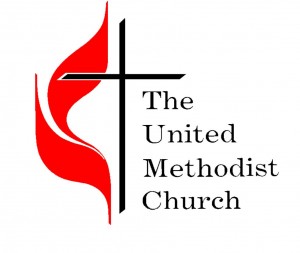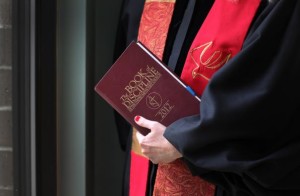 The United Methodist Church (UMC), at 7.2 million US members, is the largest mainline Protestant church, the 2nd largest Protestant church and the 3rd largest Christian church in the US. The UMC is the result of the union of the Methodist Church (US) and the Evangelical United Brethren Church in 1968. Like TEC the UMC has overseas units. The UMC units are mostly in Africa and Asia, with a combined membership of 4.4 million. The worldwide membership of the UMC was almost 12 million in 2014.
The United Methodist Church (UMC), at 7.2 million US members, is the largest mainline Protestant church, the 2nd largest Protestant church and the 3rd largest Christian church in the US. The UMC is the result of the union of the Methodist Church (US) and the Evangelical United Brethren Church in 1968. Like TEC the UMC has overseas units. The UMC units are mostly in Africa and Asia, with a combined membership of 4.4 million. The worldwide membership of the UMC was almost 12 million in 2014.
The UMC is a modified episcopal church, without claim to Apostolic succession. Methodists are cousins to Anglicans. The founders of Methodism were John & Charles Wesley, both priests in the Church of England. The Methodist Church became separate from the Church of England in the US colonies in a similar fashion as the Episcopal Church after the defeat of the British in the Revolutionary War. When John Wesley was unsuccessful in getting the Church of England to send a bishop to Methodists in North America, Methodist Anglican priests resorted to ordaining Methodist clergy themselves. The UMC embraces elements of both the liturgical and evangelical forms of Christianity. The UMC consists of 122 Annual Conferences united into 69 episcopal regions. Some Methodist bishops preside over more than one Annual Conference.
For as long as TEC has been struggling with LGBT equality of all the baptized, so has the UMC. And like TEC’s overseas units, the UMC overseas units are more conservative than their US counterparts. Unlike TEC, the UMC overseas units are large enough that their representatives at the UMC quadrennial General Conference have so far been successful in preventing the UMC from embracing the full equality of its LGBT baptized. And the overseas units, unlike their US counterparts, are growing larger.
The UMC is governed by the United Methodist Book of Discipline (BoD). The BoD is agreed to every 4 years at the General Conference of the church. The BoD affirms that all persons are individuals of sacred worth, created in the image of God and encourages United Methodists to be in ministry with and for all people. However, the BoD also states that homosexuality is incompatible with scripture and that avowed, practicing homosexuals may not be ordained as ministers. It further states that marriage is only between one man and one woman and further, forbids UMC clergy from officiating at the celebrations of same gender unions or marriages. Over the years a number of UMC clergy have been tried and defrocked for participating in same gender unions/marriages.
At the last General Conference in 2012, there was a showdown between progressive US Methodists and conservative Methodists boosted by folks mainly from Africa and Asia, regarding removing the sections of the BoD forbidding the ordination of LGBT candidates for ministry and officiating at same gender unions/marriages. The conservatives prevailed and those provisions of the BoD remained. In light of the consistent failure of pro-LGBT equality measures at UMC General Conferences, there have been calls for schism. Some progressive Methodists have voiced the opinion that failure to agree on LGBT equality in the UMC are sufficient grounds to divide the church.
Since 2012, two regional Annual Conferences in the US have taken steps to sidestep the BoD. Candidates for ordained ministry in each region’s Annual Conference must be approved by the Annual Conference’s Board of Ordained Ministry (BoOM). The BoOM of the Baltimore-Washington Annual Conference recently approved the candidacy of a married lesbian to the provisional diaconate. They did so by ignoring the BoD’s sections with regard to the sexuality and married life of the candidate. Weeks later the regional New York Conference’s BoOM issued a statement welcoming sexual minority candidates for ministry to apply. Other regional BoOMs have also quietly gone forward with sexual minority clergy candidates by observing an unspoken “don’t ask/don’t tell” policy.
Many believe that this is leading up to another General Conference showdown in MAY 2016 in Portland OR. LGBT issues are once again scheduled for the conference agenda. Four years after 2012, there is a larger head of steam for LGBT and marriage equality.
The images are from umc.org.
The information for this story was gathered from the Wikipedia entry on the UMC and from the articles linked in the story

